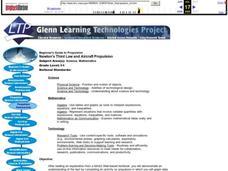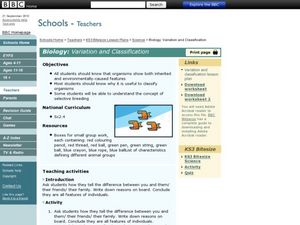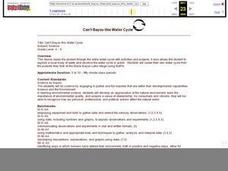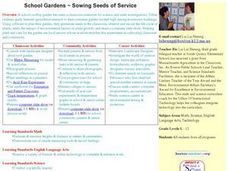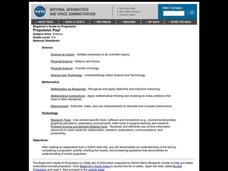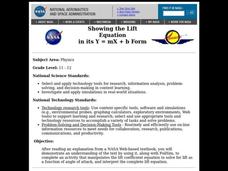Curated OER
Human Ecology: How it Relates to Population
Ninth graders are introduced to the concept of population. In groups, they research the problems associated with overpopulation and underpopulation. They practice calculating birth and death rates and discus how they can be used to...
Curated OER
Embryological Development Using Medaka Fish
Students analyze and record major events that occur in the development of Medaka fish eggs from fertilization to hatching. In small group, students describe the processes involved, creating a timeline of the major events in the...
Curated OER
Newton's Third Law and Aircraft Propulsion
Learners research propulsion, graph data, and interpret the results.
Curated OER
Biology: Variation and Classification
Students investigate classification of different animal groups. In this biology instructional activity students list characteristics of themselves and others they know to show differences and how they are classified. Students then answer...
Curated OER
Locating the Salt Front
Learners use Hudson River salinity data to create a line
graph that shows the location of the salt front, and use math
skills to explore how this location varies over time. They use the graph to estimate the location of the salt front...
Curated OER
Gwynns Falls
Students investigate the question: What is the impact of urban development and expansion on the health of a decidious forest ecosystem and humans? They examine the issue of land development by responding to a specific scenario and...
Curated OER
Can't Bayou this Water Cycle
Students identify the stages in the water cycle. They observe a local water source and view the cycle in action. They create their own water cycle using software.
Curated OER
Stream Flow in Blacks Creek
Students explore what factors affect the stream flow in a local body of water. They collect data to measure stream flow and discharge and construct a hypothesis concerning the factors affecting stream flow.
Curated OER
Weather for Health
Ninth graders encounter various types of numerical information (represented in multiple ways), much of which is abstract and difficult to comprehend. In this lesson, 9th graders will convert given information into bar graphs. In the...
Curated OER
Sowing Seeds of Service
Third graders use metric measuring for model and actual plan in designing a roof garden. They photograph the process, record results in a journal, and plant seedlings in small containers. Finally, 3rd graders complete an acid rain...
Curated OER
Pixel Transmission
Students develop code systems to transmit information between groups. They explore, explain and apply techniques used to transmit remote sensing data to better understand remote sensing images.
Curated OER
Bioremediation
Students design and conduct investigations that illustrate the effect bioremediation has on organic matter and determine environmental applications. They, in groups, present their findings to the class.
Curated OER
Water: On the Surface and in the Ground
Students explore the differences between surface water and ground water. They collect data using maps and graphs and investigate a Texas river basin and a nearby aquifer. They complete a written report including maps and data regarding...
Curated OER
Math Lesson: How Many People Live There?
Students are able to calculate the population density of a country, and calculate the population density of large cities in that country. They are able to create an appropriate graph to represent their data for that country.
Curated OER
TV Documentary on Coal
Students are divided into five groups with each group assigned one of the following topics: how coal is formed, how coal is mined, how coal is used to create energy, environmental impact of coal mining, and the benefits of coal energy....
Curated OER
Propulsion Pop!
Students demonstrate an understanding of the text by completing a propulsion activity, charting the results, and answering questions that demonstrate an understanding of rocket propulsion.
Curated OER
Design of Airfoils and Problem- Solving Using FoilSim
Ninth graders, after reading the explanation given below, complete the problem-solving activities to demonstrate an understanding of the concepts presented.
Curated OER
Scientific Research
Students examine the process of scientific inquiry. They develop twenty questions, categorize the questions, develop a research proposal, analyze data, draw conclusions, and explain how their research connects to the state standards.
Curated OER
The Baseball and Air
Students use Curveball to complete the activity to determine how the speed of airstreams changes in relation to changes in the distance of the airstream from the center of the baseball.
Curated OER
Did You Catch My Drift?
Students, through the use of the Curveball interactive software package, become familiar with the way in which the flow of air across or around an object affects its ability to lift, spin, and curve. After reading the explanation given...
Curated OER
Using FoilSim to Measure Your Elevation
Students, after designing model wings, demonstrate an understanding of wing design by testing models of the wing types both experimentally and by computer modeling in FoilSim and then presenting their results.
Curated OER
Global Symposium
Ninth graders work together to develop a sysnopis on the Earth. Using the Internet and print sources, they focus on one country to research and determine its condition. They offer possible solutions to the problem and share their...
Curated OER
Showing the Lift Equation
Learners read an explanation from a NASA Web-based textbook, then demonstrate an understanding of the text by using it, along with FoilSim, to complete an activity that manipulates the lift coefficient equation.
Curated OER
Glacial Change
Students research the ways in which scientists study glaciers and glacial change. They interpret real time data and calculate the estimated global sea level rise potential. A very good lesson to illustrate global warming.




